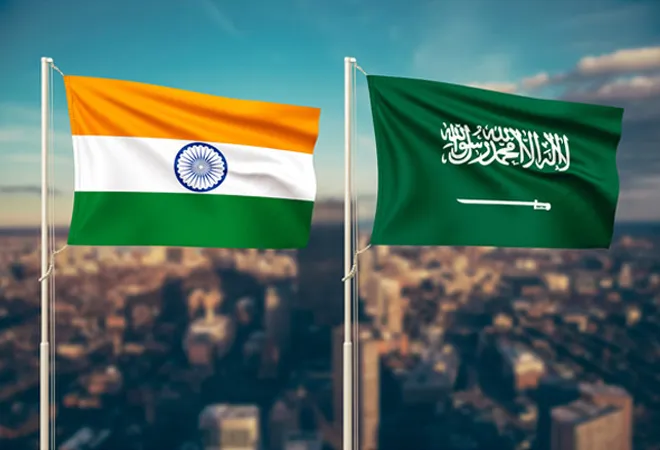
The new responsibility which has been taken up by India, as the president of the G20 intergovernmental forum, has come about at this juncture when New Delhi is working unrelentingly towards enhancing its partnerships with the international community. Its current relations with the G20 members, with the exception of a few countries, are on a satisfactory trajectory, with prospects for further improvements in the near future. The presidency, which India has recently assumed for the period between
1 December 2022 and 30 November 2023, will likely open more avenues for cooperation on multiple fronts (and also bilaterally) with countries like Saudi Arabia, a key Gulf Cooperation Council (GCC) country, also a member state of G20.
Military-security and defence cooperation have also gained momentum, which has been triggered by a certain commonality of security threats and challenges, and the interests of the respective governments to collaborate in the defence industrial sector (within the ambit of their military modernisation programmes).
Since the last few years, India-Saudi Arabia relations have become comprehensive and robust, with the kingdom not only becoming New Delhi’s fourth largest trading partner but also an important collaborator in the joint combat against all forms of terrorism, money laundering, and terror financing. It is noteworthy that the bilateral trade in the fiscal year 2021-2022 stood at
US$42.8 billion, and the kingdom alone accounts for 18 percent of India’s energy import, which reflects the significance of the country from the standpoint of New Delhi’s energy and economic security calculus. Simultaneously, military-security and
defence cooperation have also gained momentum, which has been triggered by a certain commonality of security threats and challenges, and the interests of the respective governments to collaborate in the defence industrial sector (within the ambit of their military modernisation programmes). That said, the ties between the two countries, now, are not only concentrated on the oil-energy trade alone (as it has been the pattern) but both sides have started to explore the possibilities of working together on domains such as renewable energy, climate change, healthcare, food security, education, technology, etc. These, apparently, are some of the important areas that G20 presently focuses upon, and were also adequately highlighted in the
G20 Bali Leaders’ Declaration of November 2022. In view of this, within the larger framework of this forum, bothcountries, in all likelihood, would use it as a platform to scale up their bilateral cooperation, with a possibility to establish ‘mini-lateral’ engagements with like-minded member countries on some aspects.
Lately, India as well as Saudi Arabia are placing immense importance towards investing in the respective renewable energy sector. It is discernible that forging partnerships in this particular area has gained increasing traction in India’s foreign policy over the last few years, and so is the case with Saudi Arabia. In November 2020, Narendra Modi, the Indian Prime Minister, called on foreign investors to
“invest on their own” or to collaborate with Indian companies in the country’s green energy sector. Similarly, Saudi Arabia, striving to reduce its dependency on a hydrocarbon-based economy, is investing in the same sector. In line with its Saudi Vision 2030 programme, it launched (in 2021) the Saudi Green Initiative which works on
“increasing Saudi Arabia’s reliance on clean energy, offsetting emissions, and protecting the environment…” In light of this, Riyadh, ushering in a new era of energy diplomacy, is building partnerships with countries that have similar ambitions. This, to a great extent, has facilitated the need to expand cooperation with India in the renewable energy sphere. While the Indian government works towards generating
450 Gigawatt—about 60 percent— of electricity using renewable and clean sources, Saudi Arabia also aims at about
50 per cent, both to be achieved by the year 2030.
Riyadh, ushering in a new era of energy diplomacy, is building partnerships with countries that have similar ambitions.
The realisation of an urgency to lessen the reliance on fast-depleting fossil fuel energy resources, imperative requirement to cut down the rate of carbon emissions and also to mitigate challenges emanating out of environmental degradation (as a result of rapid climate change) have resulted in India and Saudi Arabia giving priorities towards the development and deployment of renewable energy and related technology. Although at a nascent stage, the leaderships of these two countries are increasingly showing mutual interest to engage more actively in this domain. To this end, India’s initial participation in the construction of a mega solar power plant has begun after the Mumbai-based Larsen & Toubro (L&T) bagged a contract, in early 2021, to construct
Sudair solar PV project—the world’s biggest (with a capacity of 1.5 gigawatts) in Saudi Arabia. Alongside this transactional arrangement, collaborative efforts are reportedly being sought for linking the west coast of Gujarat (in India) with the West Asian (WA) region (particularly along the Saudi coastline) with the help of undersea cables, at an estimated cost ranging between
US$15 billion and US$18 billion. One of the objectives of this project is to create a renewable or green energy grid, also to resolve problems pertaining to fluctuations in
solar and wind energy. Being one of the founders of the
International Solar Alliance, the present Indian government exhibits great interest in materialising this project, which is now in the early phase of discussion. Moreover, given the centrality of renewable energy for sustainable developments in the emerging world order, India and the G20 members (let alone Saudi Arabia) are expected to make further investments in such initiatives, also creating room for the participation of other countries which share similar interests.
Following the outbreak of the COVID-19 global pandemic in late 2019, the international community has become cognisant of the existential threat such a disease could pose not only to public health but also to global security, economy and
supply chain. Undoubtedly, this unforeseen phenomenon has reinforced the need to have a comprehensive understanding of all aspects of security—traditional and non-traditional. As a result, India has stepped up its healthcare-related engagements with the wider
West Asian region, and, particularly in matters related to the production of vaccines, joint medical researches, exchange of best-fit practices, and so on. With the focus given by the G20 grouping towards promoting strong health systems, India and Saudi Arabia should also pay more attention to this aspect bilaterally, alongside their constructive involvement with the forum. During the peak of the aforementioned pandemic, the Indian government assisted its Saudi counterpart in their fight against this outbreak, mainly by dispatching
hundreds of Indian healthcare professionals. Saudi Arabia was also one of the few countries that recognised “Serum Institute of India’s
Covishield as an approved COVID-19 vaccine” for any travellers who wanted to enter the kingdom. Now, what could act as a catalyst in elevating the interactions from the existing level is the Indo-Saudi
Memorandum of Understanding (MoU) on health and medical products regulations that were signed during the 2019 visit of Modi to Riyadh. In the presence of such a formal agreement, it should not be a herculean task for both sides to provide an impetus to this area of cooperation.
Given the unpredictability nature of this infectious disease, there should be scope for further cooperation and coordination with other G20 members that have attained advancements in the field of health and medical sciences. This could include joint collaboration in the production of medicines/vaccines, funding of research projects, exchange of research papers on various diseases/illnesses, regular exchanges of professionals between institutes and laboratories, and sharing and exchanges of best practices adopted in respective member states (of G20).
With the focus given by the G20 grouping towards promoting strong health systems, India and Saudi Arabia should also pay more attention to this aspect bilaterally, alongside their constructive involvement with the forum.
Acknowledging the existing global
challenges to food security, the G20 forum has stated clearly about “taking urgent actions to save lives, prevent hunger and malnutrition, particularly to address the vulnerabilities of developing countries, and call for an accelerated transformation towards sustainable and resilient agriculture and food systems and supply chains.” This is a mutually-shared area of interest for India and Saudi Arabia, and also for the United Arab Emirates (UAE) to work jointly to tackle various issues related to food insecurity, including shortages, fertilisers and pricing. It could be noted that, in 2019, to act as a safeguard from any food insecurity, these two GCC states decided to invest in India’s
organic and food processing industries. With India’s expertise in the field of crop production and overall agricultural activities, and also being a net exporter of agricultural commodities (especially rice), strengthening of partnerships could prove to be highly beneficial for the populace of Saudi Arabia and the UAE, and other GCC countries that continue to depend on external sources for their food security, mostly owing to the lack of fertile soil.
Finally, the fact that India has invited other GCC partners, namely
Oman and the UAE, and
Egypt from the North African (NA) region as guests for the G20 forum and to include them in all the meetings underscores the geostrategic and geoeconomic importance accorded to the WANA region by the current Indian government. Since the last seven to eight years, India’s ties with almost all the countries in this region have witnessed a considerable improvement, and most of the agendas (designed for the upcoming G20 deliberations) have already begun to be discussed bilaterally, and some under different formats, including the recently-established grouping—
I2U2 (Israel, India, the UAE, and the US). While India-Saudi Arabia ties are expected to grow further, there also exists a potential for collaboration beyond this bilateral engagement. This is precisely because, in the emerging international order, there is also a growing call for a collective response to the multidimensional crises the world is facing today. India’s G20 presidency, therefore, should be utilised with utmost craftsmanship to raise its international profile as well as use it to strengthen the bilateral and mini-lateral partnerships with the member states.
The views expressed above belong to the author(s). ORF research and analyses now available on Telegram! Click here to access our curated content — blogs, longforms and interviews.



 The new responsibility which has been taken up by India, as the president of the G20 intergovernmental forum, has come about at this juncture when New Delhi is working unrelentingly towards enhancing its partnerships with the international community. Its current relations with the G20 members, with the exception of a few countries, are on a satisfactory trajectory, with prospects for further improvements in the near future. The presidency, which India has recently assumed for the period between
The new responsibility which has been taken up by India, as the president of the G20 intergovernmental forum, has come about at this juncture when New Delhi is working unrelentingly towards enhancing its partnerships with the international community. Its current relations with the G20 members, with the exception of a few countries, are on a satisfactory trajectory, with prospects for further improvements in the near future. The presidency, which India has recently assumed for the period between  PREV
PREV


